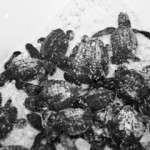NASA’s Kennedy Space Center is helping with the unprecedented effort to save wildlife from the effects of the BP Deepwater Horizon oil spill in the Gulf of Mexico.
The first group of hatchlings from endangered sea turtle eggs brought from beaches along the northern U.S. Gulf Coast was released into the Atlantic Ocean off Kennedy’s central Florida coast on July 11. Twenty-two Kemp’s ridley turtles were set free on a Kennedy Space Center beach, which is part of the Canaveral National Seashore.
After being collected on June 26, the Kemp’s ridley nest from Walton County, Fla., was packed in a Styrofoam box with sand and transported by a specially-equipped FexEx truck to a secure, climate-controlled facility at Kennedy where it was monitored until incubation was complete. Most of the nests that will be collected are from loggerhead turtles, but nests from leatherback and green turtles, in addition to Kemp’s ridley, may be brought to the Kennedy hatchery.
The release and relocation work is part of an environmental endeavor by the U.S. Fish and Wildlife Service, the Florida Fish and Wildlife Conservation Commission, the National Park Service, NOAA, FedEx and conservationists to help minimize the risk to this year’s sea turtle hatchlings from impacts of the oil spill. During the next several months, this plan involves carefully moving an anticipated 700 nests to Kennedy that have been laid on Florida Panhandle and Alabama beaches.
The Merritt Island National Wildlife Refuge was established in 1963 as an overlay of Kennedy Space Center, where it shares the land with space shuttle launch pads, rockets and research and development facilities.
As part of the Deepwater Horizon Response, six brown pelicans, four laughing gulls and one common tern also were released at Kennedy on June 6.



